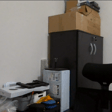Become a Creator today!Start creating today - Share your story with the world!
Start for free
00:00:00
00:00:01

10-23-2024 Release
Recommended
Transcript
First Job Experience
00:00:00
Speaker
On the first day this guy sent me to buy a lunch and I came back and I bought lunch for like four people and I give him their lunch and then I give the guy back his change and I recorded exactly how much his change was going to be. So his change is something like, I don't know, £12.74 and I put it on the desk. It's £12.74. He looks at it.
00:00:16
Speaker
He's like, what's that? ah said And it's a change. And he didn't say anything. So just wait, I was like, it's 12 pounds 74. And if he doesn't say anything, he just slides the money along his desk into the drawer. And then he looks at me. He looked at me like he was gonna kill me. And he said, on this desk, we keep the change.
00:00:45
Speaker
Rygarup is a very poor area, central Ilford. I lived on a little terrace street called Francis Avenue. ah Yeah, street full of small terraced houses. ah The trains out from Essex went right through the back garden. Canary Wharf skyscrapers, I think the first one probably went up when I was something like seven or eight, something like that. And then the latter ones went up maybe when maybe I was getting into sort of 10 or 11. And we could see them go up on the horizon. And then you know, you forget it now obviously because London's full of skyscrapers. But at the time, those were the tallest buildings in the country.
00:01:19
Speaker
And like as kids, we were like, we thought they were enormous. And you could get the um the DLR, doctrines like railways, this for those who don't know, not everyone's from London. It's this set of like kind of toy trains with no driver. And you can sit at the front, and it went through Canary Wharf. And I remember as a kid, you'd take the train through, look sit at the front, pretend to be the driver, and look up at all these skyscrapers, which at the time, they were just seemed enormous. They seemed enormous to us. And as kids,
00:01:45
Speaker
You see those Skyers group that go up on the horizon, it is a big thing you kind
Early Life and Education
00:01:49
Speaker
of aspire to. I was good at English at school and I remember my English teacher would say, you have a very mathematical style of writing. When I was a kid, I was obsessed with like rules. My parents would know, look if you want to get Gary to do something, give him a rule. They would be they said to me, you can have one chocolate bar a week and I would be like so i would be like collecting six chocolate bars under my bed until my mum would steal them one day. like i would just be I was that kind of kid. i and In some sense, I was a natural economist. I wanted to optimise the rules that I was given. i it's weird It's weird in a way, but I had had to have a system and a set of rules for everything. And when you were growing up, what was your like understanding or relationship with with money and the economy at that point?
00:02:29
Speaker
I mean I knew that my parents were hard up and I think I like really internalized from a young age that I didn't want to take any money from my parents. I wanted to make my own money so as soon as I turned 12 or 13 or whatever like the legal ages that's when I started my first paper round. As soon as I turned 16 I tried to get a Sunday job.
00:02:48
Speaker
Once we I got to 15 people started taking drugs and there was a little bit of involvement in that and I ended up getting expelled from school when I had just turned 16 at the beginning of year 11 who expelled from school for drugs. I was a good student so everybody kind of thought, and I went to this fancy grammar school, that fancy grammar school is called Ilford County High School, you go to the in the hall, they're having and on the wall the names of the kids that went to Oxford and Cambridge.
Expulsion and Academic Recovery
00:03:12
Speaker
And you just kind of see me, I'm going to be on that wall and then suddenly you're expelled from school and everybody thinks you're going to go to prison basically. And um it was tough. I was young, you know, I just turned 16, you're separated from all of your friends. I remember I woke up the next day.
00:03:26
Speaker
And my parents were both at work. My older brother was at work. My younger sister was at school. And you're just like, well what am I going to do? you know You don't have nowhere to go for the first time in your life. you know You don't have anywhere to go. And I went and I took a shower. And in in my parents' old house, you get this rubber hose and stick it on the taps and sit in the bath. I remember sitting in the bath like holding this little rubber hose and watching the water go down the drain and thinking,
00:03:52
Speaker
That's your life if you don't do nothing. It was really hard to get into a sixth form, obviously, because I had all these great grades, but I'd been expelled from school. And I couldn't get into any local schools. and I remember I walked into, there was a school in am me called Valentine's, which is where a lot of my friends from primary school ended up going to local comp. Their teacher was a famous economics teacher and he'd written my economics textbook and I walked in randomly in the summer and I was like into the office and I was like, can I come in for sixth form? He was like, what are your grades? And I was like, eight stars, three A's. He said, did you take economics? And I said,
00:04:24
Speaker
Yeah, I took economics. He goes, what did you get? I said, I got A start. He said, what textbook did you did you study? And then I clocked, he must be this guy. And I said, oh, your textbook, sir. And that was it, he accepted me to this school. I got four A's, and I got into LSE, which is, for those who don't know, London the School of Economics.
Challenges at LSE
00:04:39
Speaker
It's a super fancy, prestigious economics university in central London, where a lot of international like International millionaires and billionaires sent their kids to study and I started there when I was 18 doing maths and economics. Suddenly at LSE everybody knew who I was and I didn't know it was because of my grades because my grades weren't like the best basically. They were good but they weren't the best and I said to my mate Sagamaldi, he's a lovely guy and I said to him why does everybody know who I am?
00:05:05
Speaker
And he was like, well, it's because of your grades. And this guy Sagamade was number one in the master department in first year, so I was like, well, your grades are better of than mine. And he said, well, yeah, of course, but nobody expected it from you. Suddenly, LSE realized, these posh boys think we're dumb. They actually think that we're stupid. And then I think that sort of, that sort of little a little bit of a fire, which made me sort of think, well, no, let's show them that we're not stupid. Yeah, I think that motivated me as well.
00:05:32
Speaker
It's a three year course and first year was quite easy. You get to second year. And everyone suddenly had gone mental, basically. And like people had become obsessed with investment banking internships, right? they They started wearing suits. People were coming to university in suits, like for no reason. And they were they started they were applying for 35 internships at a time. And they started to speak using all they would use. is They would use these acronyms you've never heard of, CDSs and CDOs and MBSs and MBA and IBD. And you'd be like,
00:06:06
Speaker
what are you got And you'd ask them, what is the acronym? And they'd be like, I don't know. but This is just like, everyone would just start, and you'd just be like, what is go going on basically? And so you speak to your mates, like, why has everybody gone mental? Because you're thinking, well, I'm gonna get the best grades, I'm gonna get but get the best job. And then my mate was like, well,
00:06:23
Speaker
This is internship year. You're like, okay, what's internship year? And then the way you get a job is you get an internship now. You can't get a job unless you get an internship now. And this is a problem, right? Because I don't have my grades yet. And you know um I'm hoping I'm gonna compete on the back of my grades, but you don't have your grades yet. So you're like, okay.
00:06:39
Speaker
Well, how do we get an internship? And what what it is, is you've got to send CBN cover letter. You've got to send 35 CVs and 35 cover letters, right? And you know, my grades at undergrad were good, but everyone at LSE's undergrad grade, like, A-levels are good. Everyone at Oxford, Cambridge, all the A-levels are good, right? So, how do you stand out at that level? It's basically extracurriculars on your CV.
00:06:58
Speaker
So everyone, all of these guys from Rich Families, their families knew this, and they'd been making sure they had this extra-curricular stuff. So like, this guy would have been head of the junior United Nations, or this guy would have like founded a charity that like drives dirt bikes. He was the heart of desert for some reason. This guy would have like played the oboe at the Royal Albert Hall, you know. So basically you realize, you come in here, and you're like 19 years old, and you realize, all right, I see.
00:07:20
Speaker
these jobs are going to be distributed based on how good we are at clarinet. You realise, like, there's no way I'm going to get these joys. And then you can't... I would like to say that I realised then that the world was unfair, blah, but the truth fear is, as 19, I was just like, all right, what's the next plan? Because I think you you're a kid in London coming from a poor background. You just kind of expect these doors to be slammed in your face. So I was just like, all right, fine, I'm not going to get an internship. So what are we going to do next? And what did you do next? What was your
Citibank Internship Success
00:07:47
Speaker
plan? I was in the library one day.
00:07:49
Speaker
and this lanky northern guy with kind of like Beatles haircut. He wandered up to me, I'd never met him before, and he said, them are you Gary Stevenson? And I was like, yeah. And he said, I'd never met this guy in my life. He said to me, City Bank hires one trader a year through a card game. It's called the Trading Game, and if you win it, you can get an internship. And I was like,
00:08:10
Speaker
Well, that's good because I'm terrible at clarinet, so this is probably something that we can we can use. Why do they do that? To be honest, I think it's partially just because it gives them a little bit of a rep on campus. Like, oh, aren't city cool and different? They're like hiring somebody for a trading game. But then if you actually go back and look at the traders that city hired through the trading game.
00:08:29
Speaker
A lot of them went on to become extremely successful traders at Citibank, and I think actually if you're hiring 30 traders based on how good they are at clarinet, it kind of makes sense to hire one guy because he's good at a maths game. No, trading is not a maths game, but it is a game. And if you're able to come into this game and win it, it probably is a sign that you might be a good trader. you know What is the trading game? It's a betting game basically. It's kind of a poker style game. Basically they had their own special made decker cards. So there's some lower cards and some higher cards. We handled the cards out. So five of us are playing. We all get a card and there's three cards on the middle which get turned over as we play the game.
00:09:07
Speaker
And basically we bet with one another what the total of the cards are gonna be. I knew straight away what the LSE students would do. So if you've studied maths or economics or statistics or something like this, straight away you're gonna do this like mathematical calculation in your head which is to calculate the expected value of the total cards given the card that you have in your hand. This is not complicated maths, anyone who's studied maths will be able to do this. They'll instinctively do that and then they'll start betting around what they think the total is going to be which is a very stupid way to play the game although it's obvious because if you know you've got a high card and this guy over here has a low card and you both start quoting based on what your card is you'll be betting it's going to be the total is going to be say 70 he'll be betting the total is going to be like 50 and I can just buy at 50 sell at 70 buy at 50 sell at 70 again and again and again and again and again So there were two rounds, basically. There was an LSE round, which I won very easily. And then there was a final, yeah where they had students from like elite universities across the country, Citibank's Target universities, whatever, Oxford and Cambridge, and this kind of thing. And at that at the final, everyone had already played the games. They kind of knew the strategy. And between the first round and the final, I just didn't go to class. I spent three weeks like obsessively memorizing this game. So by the time I got to the final, I was like probably the world's like preeminent expert on this game.
00:10:27
Speaker
I had the nice strategy, which again, perhaps typically of myself, was to be very loud and a bit obnoxious in the game and try and like bully the market basically. Bully the price score I want it it to be. And I had an extremely low card in the final. And my plan was to bully the price up really high and start selling at this high price. Because I know it can't be that high because I've got this low card. And um the cards in the middle turn over and they were quite high. So I just pushed the price up and I was just trading really, really aggressively.
00:10:53
Speaker
The game finishes and everybody turns their cards over. There's eight cards in the game, five players, three in the middle. I had the lowest card possible. The other seven cards were the seven highest possible cards, which is basically statistically impossible. It's like it's like one in 10 million chance or something like this. like It's impossible happening. You realise straight away the game's been rigged against you. and Of course, I lost enormously because this thing that happened is basically statistically impossible.
00:11:18
Speaker
and um I was sort of sitting there in this high floor in the Citibank skyscraper, just asking myself, like why have they rigged the game against me? And then the guy who ran the games comes to the front and he says the winner of the game was Gary Stevenson. And he said we wanted to see what what he would do if everything turned out against him. We wanted to see someone who would back himself, and he did. So Gary's the winner. So yeah, they they they rigged the game against me, which I think is ah a little bit of a metaphor for the world that we live in, I think.
00:11:49
Speaker
and then you get onto the trading floor.
Cultural Integration at Citibank
00:11:51
Speaker
yeah Can you talk me through like that first moment, that first day? So it's it's Canary Wharf, Citibank. The trading floor is only on the second floor, it's not on the top floor.
00:12:01
Speaker
go in, I was wearing, I remember I was wearing a blue shirt and a yellow type, fat yellow type, which is the and like a terrible fitting suit jacket from Next, which is the stuff I used to wear to like go work at DFS, the sofa store I used to work. You get taken up these escalators in this massive, massive room. Trading floor is so vast, enormous room. ah You walk in and it seems like endless, like right, left, forwards. And it's, everyone has these massive walls of screens.
00:12:28
Speaker
nine screens, 12 screens that kind of go up around them like this. On the first day this guy sent me to buy a lunch and I came back and I bought lunch for like four people and I give them their lunch and then I give the guy back his change and I recorded exactly how much his change was going to be. So his change is something like, I don't know, £12.74 and I put it on the desk, it's £12.74. He looks at it. He's like, what's that? ah said And it's your change. And he didn't say anything. So just wait, I was like, it's £12.74.
00:12:59
Speaker
And if he doesn't say anything, he just slides the money along his desk into the draw. And then he looks at me. He looked at me like he was gonna kill me. And he said, on this desk, we keep the change. Just like that, and I was like.
00:13:13
Speaker
These guys are mental basically, but then I was like, fine, all right. And then I started buying everyone lunch because I was keeping the changes and making loads of money. And then they started kind of like testing me by like, oh, go buy lunch for this guy, go buy lunch for that guy. They'd order like really complicated orders from like different things to see if I could like kind of testing me like as if I'm going to fail to get lunch correctly, right? Part of me didn't like to be treated like that a little bit, but I think I was always willing to take whatever I had to take to get what I needed to get basically. you know we ah but I grew up in a very poor background and that job was going to make me a millionaire. What is weird is you might think coming from a poor background I would experience like class prejudice but the trading floor up of all the places I've ever been
00:13:52
Speaker
These guys loved me from the start. And I think it's because they have this idea of this Cockney Wide Boy trader. And also, they have this idea that the trading floor is like a super meritocratic place. So when a kid actually turns up from the local area, it makes them feel like, yeah, we are meritocratic. And I think also, like of all the places that I've been in, this was the only space where rather than being like,
00:14:13
Speaker
Poor kids are dumb. They were smart enough to realize, if this guy's managed to get this far, looking like that and speaking like that, he's probably got something about him, basically. What were the people that you met on the trading floor like? I met this guy, he was a very wealthy guy. He went on to become an amazingly profitable trader. And um he had his his own designated taxi driver who would drive him home every time he um got too drunk. And his taxi driver told me one time that every time he gets too drunk, he insists that on the way home, I drop him.
00:14:43
Speaker
outside the Bank of England. So we can go around the back of the Bank of England and take a piss on the Bank of England on the home. And I was a f***ing hero. I worked with some maniacs. There's another guy who's called Rupert who I think I'd describe as um looking like he was unexpectedly dropped off at boarding school at eight years old and not picked up till he was 21.
00:15:02
Speaker
which I later found out to be not far from the truth. This guy was just very, I think his dad was in the army, absolutely like British blue blood, like everything has to be straight, everything has to be completely narrow. Nobody can cross the line, very like rigid, angry. He told me once, he said to me, I've got a problem, which is every time I meet someone, I need to know straight away whether they're better than me or whether they're worse than me.
00:15:30
Speaker
And if they're better than me, I hate them. I hate them because they're better than me. But if they're worse than me, I despise them. I think that's why he likes hanging out with me. Because we were from such radically different class backgrounds, I think he felt that he didn't have to compare himself to me. Because people like me just don't register. Just don't register on the on the scale, basically. And he would take me out like his little Cockney sidekick in Clapham. He got me really drunk one time. And I got in trouble because I come in the next day, I threw up. I had to go to the bathroom, threw up, got sent home.
00:16:05
Speaker
And the next day, I come in really early, and the boss Caleb said to this guy, ru but Gary said it was your fault. He got a drunk. and There was an empty seat next to me, and he was the one seat there. And I just thought, don't look at him, because he'll be going mental. Just gently at first, I heard him like like like growling, slightly growling, like... Like, listen. I just thought, just don't look at him. He starts growling like louder and louder and louder, and I was just really trying not to look at him until he was growling so loudly.
00:16:31
Speaker
I thought, I better look at him. I heard this bang and he kicked, the we had these doors, like the computer like towers behind the doors, he kicked the doors and they got bang against the brackets and I looked around at him. He was turned around to me and he was gnashing his teeth like, ah, ah, like that, like a dog or like a wolf ah at me and like growling and barking at me on the in front of everyone for like 20 seconds.
00:16:57
Speaker
This is is the room full of millionaires, right? like People get paid a million pound a year to do
Early Success and Wealth Realization
00:17:01
Speaker
this. I don't want to point fingers too much at these guys as individuals because they're not all bad guys. They're real people at the end of the day. I think for me, it's a crazy space and I think it's the space that makes the people go crazy, in my mind. you land a full- time job with citibank what are you earning in the first few years of your career My first big bonus was when um was um was in the beginning of 2010 when I just turned 23.
00:17:22
Speaker
And that was just under 400,000 pounds. And that was so much more than I had been expecting. I knew traders made a lot of money, but I think people from my background, when they think of a lot of money, they think of like 100 grand. They think, oh my God, 100 grand. 100 grand is a lot of money. And that's what I thought these guys were making. And in fact, that had been my aim, to make 100 grand. And I'd ask my boss, what do I need to do to make 100 grand? And he told me, make $10 million dollars for Citibank. So I made $12 million dollars and I got paid this 400 grand.
00:17:51
Speaker
And I think it was that bonus when I was 23 that kind of blew my mind. And what was the most amount of money that you lost? Well, I lost $8 million dollars in a week when when I was in 2010 when I was still 23.
Isolation and Financial Setback
00:18:05
Speaker
I lost $8 million dollars in a week. And that was mad because I graduated in 2008, so a lot of my mates couldn't get jobs. Obviously, that was the financial crisis, right? And I was like halfway through this week by that point. I had already lost like $5 million dollars in three days. And all my mates were around just like playing Pro Evolution. And you're just thinking like,
00:18:21
Speaker
I've lost $5 million. dollars like How much more can I lose bra lose my job? um It really dehumanizes you. It's the stress and the the pressure of it. And it really for me, it really separated me from my my friends and my family. You can't sit around and tell them I lost $5 million dollars this week. you know They're not going to understand. that And also, like you don't want to You know what I mean? But at the same time, you can't think about nothing else. You can't think about nothing else. And then I got called into a meeting in early 2011 with one of the Citibank's top economists. And he went through the financial situation of a lot of the world's governments. So I don't know if you remember, in 2011 there was this big crisis with the governments of Italy, Spain, Portugal, Greece, Ireland. This is before that kicked off. And it was like all of these governments
00:19:09
Speaker
They're going massively into debt. Every year they're spending more than they can make. They're having to set off their assets. Their debts are exploding. Including the governments of the UK, the US, Japan. These are the biggest governments in the world, you know? And I come out of that meeting and I was like, how can it be my friends are losing their houses and going into debt? Their families are doing that.
00:19:30
Speaker
The world's governments are losing their assets and going into debt. Like, where are the assets going? Who is the debt to? Like, it's not possible. We can't all go into debt. Somebody has to be on the other side of that. We can't all lose our assets. Somebody has to be getting the assets. And I was sitting there. I used to have to take the sandwiches to that meeting. So I had all these sandwiches around me sitting on the desk, come at this meeting where you realize, like, all of the governments to know what I totally f***ed, basically.
00:19:54
Speaker
And you look around, and you're surrounded by these like fat millionaires in pink shirts, and you realize, like it's us, isn't it? we we are We are the guys who are accumulating. I, myself, was on the verge of becoming a millionaire at that point. You realize, this is it. like We are accumulating the assets from the middle class, from the government. and And then you realize it's not going to get better. Because if the middle class families can't afford to pay the bills when they own their own house, well, their kids definitely won't when they don't own their own houses. If governments can't run a balanced budget when they're not massively in debt, well, they definitely can't when they are massively in debt. And what I saw in that moment was it's going to spiral. It's going to get worse and worse and worse. so That wealth would continue to be sucked out of the middle class and towards the rich. And I realized straight away,
00:20:35
Speaker
that there would never be an economic recovery. And I put this massive bet on, I was an interest rates trader, so my specific bet was that interest rates would stay zero for like three years.
Ethical Dilemmas in Finance
00:20:44
Speaker
Everybody thought interest rates were gonna come up really quickly. And that bet was super successful basically, and and i I made $35 million dollars for the bank and I got i got paid millions of dollars myself. um Basically on the back of this bet that the global economy would would collapse and the society would collapse. Suddenly I was a multi-millionaire surrounded by multi-millionaires.
00:21:06
Speaker
betting the economy was gonna collapse. And I just thought, what the fuck am I doing here? Why am I here? I don't need any more money. But at the same time, I'd worked so hard to get to that space, you know what I mean? And I was the best trader in the world at that point. And you you're getting paid millions of dollars a year, you don't wanna walk away from it. But I think this is that that is the point of my career and of my life where this voice starts to come in.
00:21:31
Speaker
that says, is it right to be doing this? I don't think it's wrong for poor people to do what they have to do to make money, as long as you're not directly hurting no one. I think rich people should be giving more. I think rich people should be doing more. And at that stage of my life, I wasn't a poor person anymore, I was a rich person. And I think I knew in my heart I had to be doing more as well. And how did you get out of the trading game, the trading world?
00:21:53
Speaker
I got called in to meet with my boss. i started The thing is, this I hated that boss. I really hated him. But I had to laugh at his jokes for six months. And then suddenly I get this bonus, I don't have to laugh at the guy's jokes no more. And I was just like ripping the piss out of this guy every day. And we started to like argue a lot and he called me into his office and he was shouting at me, screaming at me.
00:22:13
Speaker
And then I just thought, what the f*** am I doing? What
Life Changes and Reflections on Society
00:22:16
Speaker
am I f***ing doing? And I just looked up to my boss and said I need to quit. And my boss was like, because at that time I was sitting back and started trading in the world, right? And then senior management went mental and eventually they decided, okay, don't quit, you're going to move to Tokyo. And I thought at the time that was a bad idea, but I thought, I said to him, I don't think that's a good idea. And he said to me, you don't understand, you have to go.
00:22:37
Speaker
And I was like, well, if you're going to be about it, then I'll go and take another and bonus, then which I did. And I moved to Tokyo. And that begins the the final fight, you could say, between me and Citibank, me leaving the bank. What was life like after you left? I went through a difficult couple of years leaving. It wasn't easy to leave. But um it was nice that that happened in Tokyo. I basically had two years of like cycling around Tokyo, eating ramen in little corner ramen bars, thinking about what it means to be walking away from a $2 million a year job.
00:23:07
Speaker
um It was weird, you know but I ah decided I wanted to do something about society collapsing. Maybe I'm a fucking idiot, but that's what I decided to do, and that's what I've been doing ever since. What's your motivation for the work you do now? I mean, is it money? Are you... I don't want society to collide. Funny people ask me this, you know. I've made millions of pounds betting that the average British family will collapse into poverty. Desperate poverty. I'm talking about Charles Dickens' Oliver twist. That is the future of this country if we don't deal with growing inequality. That is what I see. What are the biggest problems that we face in this country? it's well I mean, it's wealth inequality. It's wealth inequality. Listen, if you allow wealth to flow an unbelievably rapid rate out of your middle class, away from ordinary working families, away from the government, towards the super rich, then living standards will collapse, housing will become unaffordable, distribution matters. If we're playing chess and you take all of my pieces one at a time, I'm gonna lose that chess game. That is what I see when I see the economy. We've seen government debt explode
00:24:10
Speaker
We've seen living standards collapse for all no working people. At the same time, the biggest and fastest ever increase in the wealth of millionaires and billionaires. And nobody's connecting these two things. The reality is we've created a world which tells you you need to be rich to be happy, you need to be rich to be of value, and yet which simultaneously makes it almost impossible for them to get rich. Listen, don't buy it. Don't buy the hype on it, you know.
00:24:39
Speaker
Yeah, work hard to take care of your family and be proud of yourself. Be proud of the things that you've achieved because they're sending you a dream that they never gave you a chance to get in. and And if you buy that dream, you're going to be unhappy. And I've got friends that work really, really hard and struggle to pay the bills. And I want ah want those people to be proud because that was my dad and my mum. Yeah, we want to be proud of the work that they do and realize that that this...
00:25:07
Speaker
These stars they're putting in your eyes are for them and not you. We've got offices in Hong Kong and Mauritius in Denver, Colorado. um This calendar year will have ah sold over half a billion dollars worth of product, which is again, crazy.





